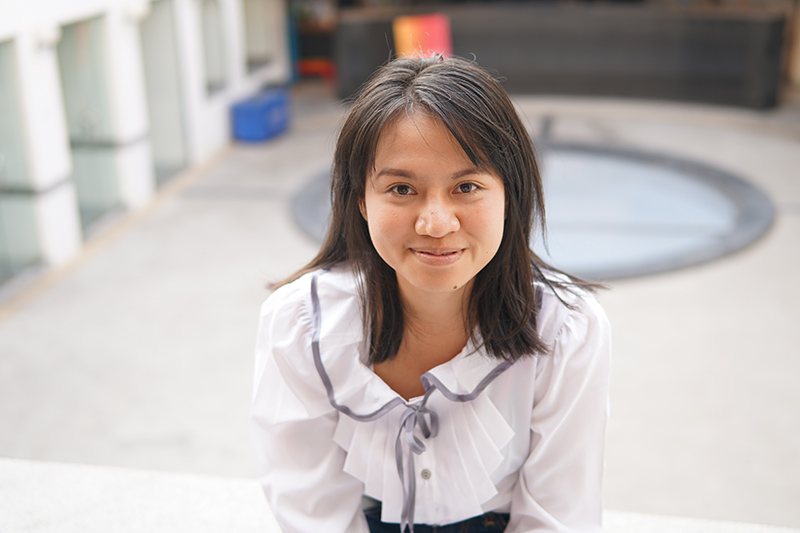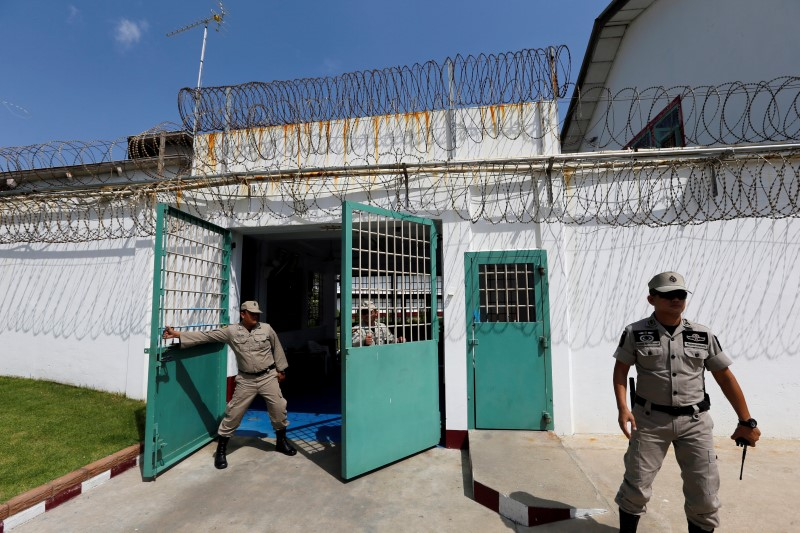Rumors about Thai prisons have not changed for decades. Low hygiene standards, overpopulation, and hidden self-governing systems are among the open secrets whispered about life in a Thai jail.
Rangsiman Rome, a 24-year-old anti-junta activist, has spent a short period of time in the infamous Klong Prem Central Prison. The Thammasat University graduate has been jailed twice. The first time was in June, 2015, when he and 13 other anti-junta activists were detained for breaking the junta’s ban on political gatherings. Full disclosure: Rangsiman is in a relationship with the author of this story.
The second time was in June, 2016, when he was arrested for campaigning against the referendum draft. In both instances, he spent 12 days in jail awaiting trial before being released.

Meanwhile, Pronthip Mankong, 28, was granted royal parole a few months before her 2-year sentence ended. She was jailed after a 2013 theatrical performance that she took part in was deemed insulting to the monarchy. She was arrested and prosecuted in 2014, and was released last August.
The two were kind enough to walk Coconuts through a typical day in Thai prison.
A typical day
The male inmates wake up at 6am. After folding their thin blankets, which they sleep on instead of mattresses, the guards start counting the inmates by having them call out numbers. They then take a group shower, using bowls to scoop water out of a large basin to wash themselves.
Breakfast is served at 7am, lunch is at noon, and dinner is served in the late afternoon when work is done. Most meals consist of low-grade rice or porridge accompanied by soups or other dishes. Rangsiman said that the food is so terrible, the only inmates who eat it are those who don’t have any money or visitors. Other inmates prefer food sent from their families or they may cook for themselves with limited supplies like rice, instant noodles, canned food, and condiments, in addition to the canteen’s free morning coffee.
At 8am, all inmates gather in line to stand and sing the national anthem. Then they’re assigned a job by the heads of the working unit (prisoners who are trusted and assigned these superior positions by the guards). Folding paper bags, making shoes, baking, and carpentry are some examples of the paid jobs. Mandatory unpaid prison work includes: cleaning, cooking, and helping the guards. Even Rangsiman, who had not been convicted but was awaiting trial, had to take on the relatively small duty of working in the library. Heavier jobs, such as construction and repair work, sometimes take place off prison grounds. These difficult jobs are a way for long-term prisoners to redeem themselves and possibly get a chance to reduce their sentence or even receive a pardon.
Every day except Sunday, prisoners lucky enough to receive visitors will be called to the reception area. Although they have to wait up to an hour to go through the screening process, they get to see and talk to relatives through bars for 20 minutes. Visitors are not allowed to bring anything to give to prisoners, but they can shop at the prison’s store and buy whatever their loved one needs.
Prisoners who finish their work will be allowed to shower from 3pm onwards. A bell will ring to summon prisoners back to their dormitories. Before 6pm, all of them must be in their rooms. They can read books, chat, or watch TV. When the TV is turned off, usually around 9pm, they must say Buddhist prayers and go to sleep.
Rangsiman believes that, because he was detained along with 13 activists in a political campaign, newspapers were completely deprived from them. Usually, prisoners have access to newspapers, but both times that Rangsiman was in prison, he was cut off from the news. Evening TV sessions are limited to game shows, music programs, and movies. When a news report started, the guards immediately changed the channel or turned the TV off.
The “house” system
Many inmates are grouped by hometown. Rangsiman was never placed in one of these “houses,” but he did observe the system.
These “houses” are a tradition in which prisoners from the same province or community stay together and share gifts from their visitors. Once an item is sent to them, whether food or basic necessities, it must be shared with other members of their group. Prisoners in each house watch out for each other. If you fight with one, it means the quarrel involves all members in the house.
“It is a mafia system that the prison is trying to banish. It gives the inmates some power,” Rangsiman said. “But also, it helps prisoners with long-term sentences and those with poorer relatives. They do not have visitors, which means they only get what prisons provide. The communal system allows them to have better food and commodities.”
The “houses” don’t often openly clash since the fighting will lead to them being punished. There are occasional cases of prisoners being killed, which can result from disputes, but Rangsiman admitted he could not say for sure.
Urinating “in-sync”
Lives for female inmates are not much different, Pronthip said. The dormitory buildings house two or three times the prisoners they were designed for. The women wake up, wash themselves, eat, and stand for the national anthem. Women’s jobs and vocational trainings tend to be more “traditionally feminine” — they learn quilting, embroidery, hairdressing, and how to give a Thai massage.

But, as in the male prisons, poor management means prisoners don’t always get the necessities they need — including feminine products.
Pronthip says the inmates receive free sanitary pads and basic toiletries in a big batch twice a year, but guards will occasionally raid their small lockers and make sure they don’t store “more than two of each item” as they can be used as “currency” in prison. For example, one inmate may offer a sanitary pad to another for their “services,” which can be as basic as doing laundry.
Due to the regular raids, inmates cannot stock up on basic feminine products in their lockers, resulting in a shortage. Pronthip sometimes gave sanitary pads to her cell mates who had no visitors to offer them a monthly supply.
“How can you expect prisoners who are serving over 10 years to go through months with no more than two toiletries? They don’t know when their relatives are going to stop visiting them [and sending necessary items]” said the dismayed Pronthip.
Also, the poor waste management system means lots of used sanitary pads end up clogging toilet bowls and sewers. Even worse, the thousands of inmates are only allowed to use the toilets during designated times “as if they want us to pee in sync,” according to Pronthip.
No one talks to the farangs
Both Rangsiman and Pronthip agree that the main problem for foreign inmates is the language barrier. Guards cannot speak English or other languages, nor do they care. As a result, the foreigners cannot access certain provided materials and need help from fellow inmates to write a complaint, request medical treatment, etc.
“They are not discriminated against. It’s just that no one can talk to them, so they have to stick together,” said Rangsiman.
Another problem is their different physiques. The overpopulated dormitories allow little to no space to lay down. Westerners, being taller than most Thais, have a hard time falling asleep, and need to be extra careful not to let their limbs encroach on someone else’s space.
Thailand’s consular relationship with other countries, surprisingly, does affect the imprisoned foreigners. Pronthip said that Chinese inmates, for example, recieve Chinese newspapers as part of the contract with their embassy, and are usually bailed out by the embassy. Christian prisoners, many of whom are Africans, get frequent visits from missionaries, according to Rangsiman.
Gettin’ some
While sex is prohibited, both Rangsiman and Pronthip have witnessed other inmates satisfying their basic human needs.
“Tomboys are super desirable. Women throw themselves at them, shower with them and give them stuff,” Pronthip said, noting that some female prisoners adopt the masculine look and dabble in lesbianism when they go to prison.
“I know butches who had a lot of girlfriends in prison, but settled down with men and had children after they got out.”
If female inmates are caught having sex, Pronthip said that they will face public reprimand and discipline.
Meanwhile, in the male prison, Rangsiman has involuntarily witnessed more heated acts than Pronthip. He observed that being incarcerated with only men for a certain amount of time has messed with prisoner’s sex drives.
“Many men get visibly horny just by seeing women’s thighs or shoulders on a TV show. It’s creepy,” Rangsiman recalled, “I myself have never seen anyone having sex, but I’ve seen them jerking off in the doorless toilet stalls. Hooking up is not uncommon either.”
Final words
The harsh conditions in prison are believed by many Thais to help keep people from becoming repeat offenders once they are released, even if the research proves otherwise. Thai prisons are no purgatories, just hell, according to Rangsiman. Dehumanizing the convicted cannot fix them, he added.
“Many of the prisoners are not bad people. They are just like us. I think Thai society is responsible for lots of the crimes they committed. Lots of criminals are from the lower socioeconomic class who struggle to have a better life, and they do not think of their actions as harmful — like this guy who found a lost check and cashed it. He was very sympathetic, always giving to other inmates.”
For Pronthip, Thai prison fails at reforming the wrongdoers.
“It does not help. At all.” Pronthip emphasized “It does not guarantee that people who serve their time will feel remorse. There is no correction system to make them realize their wrongdoings. Prisons are just places where the convicted are thrown, with the hope that they will repent for their mistakes.”
Lack of correctional process and various criminals locked together mean the prison becomes a criminal college where newbies learn skills and form a connection with the veterans. Rangsiman and Pronthip agree that ex-convicts are perceived badly and discriminated against in society. This means they face difficulty finding a job and getting back on their feet afterwards.
When society does not give them the chance to redeem themselves, they are forced to return to the criminal lifestyle, and the vicious cycle continues.
Pronthip says that, after all, she was thankful for her experience “at the bottom of society.” It gave her insight into human nature, and the chance to experience life in the part of society that most people look away from.
“Now, I look at the convicted with more compassion” Rangsiman concluded, “To fix criminals, the society must be more sympathetic too.”
Editor’s Note: We have updated this story to include the information that interview subject Rangsiman Rome is in a relationship with the author.





Reader Interactions